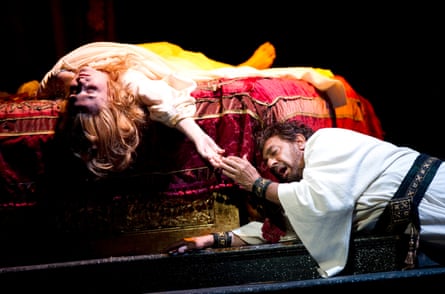Placido Domingo’s total withdrawal from the Metropolitan Opera in the wake of continuing sexual harassment allegations against him ought to mark a line in the sand for the operatic world. The problem, however, is that when the world of opera is confronted with an expanse of sand, its instinct is to bury its head in it.
From the moment the allegations against Domingo from women at the Los Angeles and Washington operas first erupted in public in August, it was clear that the 78-year-old’s performances this month at the New York Met, where he has performed since 1968, should have been put on ice. The allegations, which Domingo denies, often in very dignified language, were serious. The Met must have known that the singer’s next US performances – in Verdi’s Macbeth at the Met starting this week – could not go ahead in such an atmosphere.
And yet, the Met allowed the issue to remain unresolved until the very eve of its 2019-20 season today. Domingo remained scheduled to open the season. He came to New York and took part in rehearsals, including last Saturday’s dress rehearsal. It appears that it was only since Saturday that the issue of Domingo’s participation finally came to its inevitable head and resulted in its predictable conclusion. Meetings – some of them described as heated – between staff and the Met’s general manager Peter Gelb are said to have forced the issue. At the 11th hour, the company issued a statement saying: “The Met and Mr Domingo are in agreement that he needed to step down.”

Where do this week’s developments leave the Royal Opera House in London? Domingo is just as much of a favourite performer at Covent Garden as he is at the Met. He has been appearing there since 1971 and he is scheduled to return next summer in Verdi’s Don Carlo. But the question of his continued involvement is now an increasingly embarrassing one for the Covent Garden management. Like all the houses where Domingo still performs, the Royal Opera House love the glamour and the artistry, not to mention the ticket-price income, that Domingo brings. But Covent Garden is living in a dream world if it imagines these performances can or should still go ahead.
That is particularly pressing in the light of the news this week that one of the star tenors of the post-Domingo era has just been suspended by the Royal Opera after allegations that he groped a woman cast member on stage during a tour of Japan. The behaviour of Vittorio Grigolo, who once joked that he was a sex addict, is reported to have provoked an angry reaction from members of the chorus.
Grigolo is due to perform at La Scala, Milan, next week and at the Vienna State Opera later in October. Those houses are now caught in the spotlight. Covent Garden’s actions in the Grigolo case now pose precisely the same issues for Milan and Vienna as those of the LA Opera in the Domingo case posed for the Met, and which the Met’s actions against Domingo now also pose for Covent Garden. They simply cannot be ignored, although many will try. When Domingo appeared at the Salzburg Festival this summer after the accusations against him had broken, he was received with two standing ovations.
There is certainly room for a variety of views about the #MeToo movement and its effects. And Domingo’s status as one of the greatest tenors of all time is secure. But sexual harassment has long been a feature of the opera world as well as other workplaces, and there is no room for the view, which is still all too common, that opera houses can simply ignore it.

